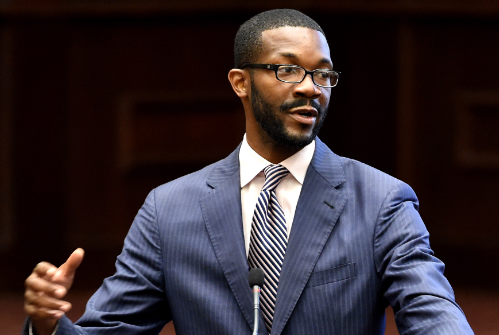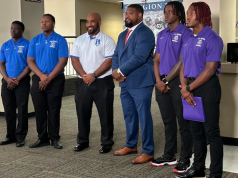By Mayor Randall L. Woodfin

Progress is under way in Birmingham. The city recently passed a budget with overwhelming support, making this the first budget passed before the fiscal year in four years. Two million dollars was allocated to demolish blighted properties. City employees received raises for their hard work, and senior employees obtained the longevity pay they rightfully deserved. Also, financial support continues for our 99 neighborhood associations, public transportation and education.
In 100 days, we demolished more than 100 abandoned or dilapidated homes, removing eyesores and problem areas from various neighborhoods. But we can’t just be in the blight elimination business. We must rebuild communities in a way that reflects the desires of our residents. There’s always more that can be done to build and improve affordable housing for families across the city. Plus, there are countless homegrown businesses that still need our support.
My administration is working on ways to get this done. One way is to take full advantage of the Investing in Opportunity Act.
This act designates various neighborhoods as “Opportunity Zones” that will be eligible for investments in small business, neighborhood developments like grocery stores, commercial projects and affordable housing. It does this by allowing banks, corporations and other investors to commit dollars into “Opportunity Funds” that, by law, have to be invested in our most under-resourced neighborhoods.
Alabama could only designate 158 Opportunity Zones of more than 900 areas that were eligible statewide. Birmingham fought hard to get as many areas for new investment at possible. We were successful. There are Opportunity Zones in every Birmingham City Council district.
Although we didn’t get everything we wanted, Birmingham has the largest number of Opportunity Zones of any city in the state, and more than double the next highest city. Our zones include 24 census tracts that cover 77 neighborhoods. These areas are ripe for investment, poised for community development and inclusive economic growth.
This is big for Birmingham – so big, in fact, that I’ve instructed our Department of Innovation and Economic Opportunity to take the lead on an effort that will help revitalize neighborhoods. Change through this effort won’t happen overnight or even in six months. But, my administration will continue to be aggressive to take advantage of this national opportunity to improve the quality of life for residents over the next decade.
I have your best interests at heart in building up our neighborhoods. And, I care what you think. Exactly what do you want to see in your neighborhoods? Affordable housing. A grocery store? A retail center? More jobs? This fall, the Department of Innovation and Economic Opportunity and a team of committed citizens will hold town hall meetings to get your input.
We remain committed to investing in our communities, recognizing that through Birmingham’s distinct neighborhoods, positive momentum and unique history we are a vibrant city. This is another good start to what I know will yield good results down the road.
As I write this, I ask that residents remain patient with me on this journey. We have thought really hard about this. And, we are not finished thinking about this. This effort will not produce “quick wins,” but it will produce long-lasting change in communities that we believe in and the places where we live.
This is only the beginning.
My office is working on a link for residents and businesses to learn if their address is in an Opportunity Zone. To find out if your home is in an Opportunity Zone, please visit www.birminghamal.gov/about/city-directory/planning-engineering-permits/opportunityzones.





